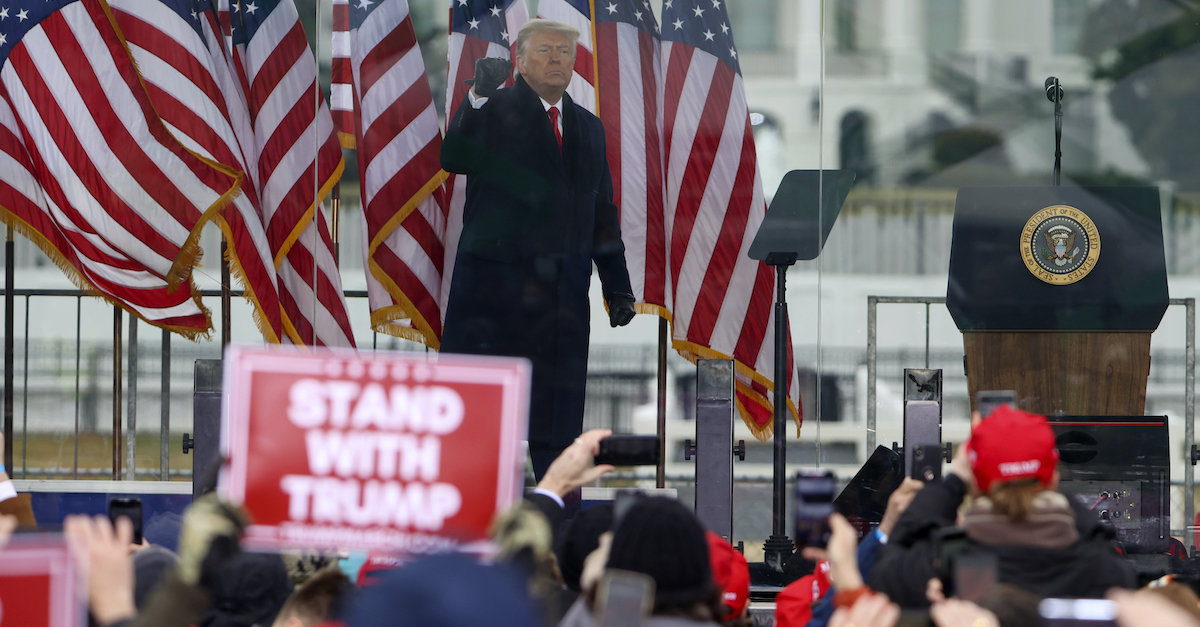
Former President Donald Trump delivers a speech at the Ellipse on Jan. 6, shortly before his mob of supporters ran riot inside the U.S. Capitol. (Photo by Tasos Katopodis/Getty Images)
A federal appellate panel in Washington, D.C., sided, for now, with Capitol police officers and members of Congress by affirming the lower court’s rejection of Donald Trump’s claims of presidential immunity from three lawsuits alleging liability for Jan. 6.
The three cases were brought by U.S. Capitol Police Officers James Blassingame and Sidney Hemby, and members of Congress at the Capitol on Jan. 6, such as Rep. Eric Swalwell, a Democratic lawmaker from California, and Rep. Bennie Thompson, a Democrat from Mississippi who served as the Jan. 6 Committee chairman.
Chief Judge of the U.S. Court of Appeals for the D.C. Circuit Sri Srinivasan penned the opinion, saying that Trump, “at least at this stage of the proceedings,” failed to show he was acting in his official capacity and immune from liability on that basis when he spoke at the Jan. 6 “stop the steal” rally which preceded the violence at the Capitol and halted the congressional certification of the electoral vote:
President Trump moved in the district court to dismiss the claims against him, including on grounds of a President’s official-act immunity from damages liability. The district court largely rejected his claim of immunity, and President Trump now appeals. The sole issue before us is whether President Trump has demonstrated an entitlement to official-act immunity for his actions leading up to and on January 6 as alleged in the complaints.
We answer no, at least at this stage of the proceedings. When a first-term President opts to seek a second term, his campaign to win re-election is not an official presidential act. The Office of the Presidency as an institution is agnostic about who will occupy it next. And campaigning to gain that office is not an official act of the office. So, when a sitting President running for a second term attends a private fundraiser for his re-election effort, hires (or fires) his campaign staff, cuts a political ad supporting his candidacy, or speaks at a campaign rally funded and organized by his re-election campaign committee, he is not carrying out the official duties of the presidency. He is acting as office-seeker, not office-holder—no less than are the persons running against him when they take precisely the same actions in their competing campaigns to attain precisely the same office.
Srinivasan, a Barack Obama appointee, said that the ruling wasn’t the last word on the immunity question, however.
“In sum, the Court’s approach is well-tailored to identify campaign speech that can reasonably be viewed only as unofficial. It does not threaten to strip immunity from other kinds of presidential speech. It is flexible enough to accommodate rare cases where even speech made during a campaign event may be official,” Srinivasan wrote. “And it is cautious, in leaving open both the question whether the speech at issue is entitled to immunity and, if not, whether the First Amendment nonetheless protects it.”
U.S. Circuit Judge Gregory Katsas, a Trump appointee, concurred and Senior U.S. Circuit Judge Judith Rogers, a Bill Clinton appointee, concurred “in the court’s substantive legal analysis of the sole issue before the court” but emphasized it was a partial concurrence.
“Mine is a partial concurrence because the remaining parts of the court’s opinion address issues unnecessary to dispose of the sole issue now on appeal,” Rogers explained [citations removed for ease of reading]. “The court has no occasion to define a ‘framework’ of analysis for the district court on remand and acknowledges that its framework does not apply now. The Supreme Court’s framework in Nixon and Clinton suffices.”
“Similarly,” Rogers continued, “the court has no occasion to address additional contentions of the plaintiffs, nor the contention by the United States in response to the request for its views. Those contentions may become relevant during the district court’s continued consideration of the parties’ arguments but they are not yet before this court.”
Ultimately, though, Rogers agreed there was “no basis for granting immunity for conduct (or speech) the President himself contemporaneously recognizes he undertakes in his personal, unofficial capacity as a candidate.”
Like Srinivasan, Katsas stressed that the court did not “definitively resolve” the immunity question.
“Instead, we hold only that we cannot resolve it on a motion to dismiss,” Katsas wrote.
Read the D.C. Circuit ruling here.
Have a tip we should know? [email protected]

